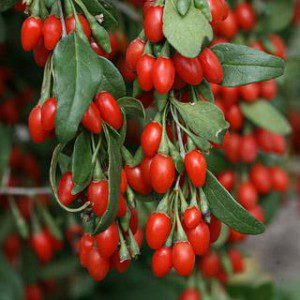Contributing Writer for Wake Up World
Promising research on goji berry (Lycium barbarum) has shown a positive correlation between consumption of the fruit and neuroprotective benefits that minimize the ravaging effects of Alzheimer’s.
These findings give a ray of hope to the over 4.5 million Americans who suffer from the disease. A staple in traditional Chinese medicine (TCM), goji is an exceptional superfood that safeguards the health of both body and mind.
Not your average berry
Packed with important nutrients like ascorbic acid, beta-carotene, polysaccharides, lutein, zeaxanthin, B and E vitamins along with trace minerals such as zinc, copper, calcium and selenium, it’s no wonder goji has been used by TCM for over 2,000 years.
Traditionally consumed to heal kidney complaints, cleanse the blood and improve sexual stamina, goji berries have a rich healing history. With a high oxygen radical absorbance capacity (ORAC) rating and brimming with antioxidants, the berries have been shown to improve vision, protect against cancer and increase immune response. And now researchers suspect goji may insulate the brain from toxic beta amyloid proteins.
Neuroprotective superstar
A study at the University of Hong Kong found aqueous extracts of goji disrupt the neurotoxic qualities of proteins within the brain which are associated with Alzheimer’s disease. According to Advanced Natural Medicine:
… preliminary research has discovered that goji guards against the formation of specific compounds typically found in the brains of Alzheimer’s patients. Using a laboratory model of Alzheimer’s, scientists found that goji protected brain cells from the harmful effects of beta amyloid peptides, damaging agents that are linked to the pathological changes seen in the brains of Alzheimer’s patients. These findings suggest that goji just might help prevent this memory-robbing disease.
The researcher’s believe goji berry extract may play a pivotal role in creating future treatments for Alzheimer’s. In the meantime, consuming goji on a daily basis is a smart protective habit. Whether straight-up raw, juiced, brewed as tea or in tincture form, this small bright red berry offers a wealth of health enhancing nutrition.
Sources for this article include:
http://www.rubygoji.com/download/pdf/library-029.pdf
http://www.advancednaturalmedicine.com
Previous articles by Carolanne:
- Feeling Physically & Mentally Overwhelmed? Try Ashwagandha, a Wonder Herb for Anxiety, Stress & Toxic Overload
- Kick the Caffeine Habit and Feel Better Quick with these Natural Alternatives
-
Yet Another Reason to go Organic – Research Verifies it Really is More Nutritious
- Warning: Genetically Modified “Agent Orange Corn” Coming Soon to a Plate Near You
- Inspire Physical, Emotional and Spiritual Transformation with Holotropic Breathwork
- Top 10 Food Frauds: Formaldehyde, Plastic, Melamine & Caustic Soda Found in Common Foods
- Autistic Boy With Higher IQ Than Einstein Discovers Gift After Removal From State-Run Therapy
About the author:
I’m Carolanne — a writer, chef, traveler and enthusiastic advocate for sustainability, organics and joyful living. It’s good to have you here. If you would like to learn more, connect with me at Thrive-Living.net or visit Twitter.com/Thrive_Living.Please note: this article was first published on Natural News.

If you've found value in our articles, we invite you to support the release of our brand-new book, "Gratitude Practices for Kids: A Practical Guide for Adults to Instill a Spirit of Appreciation and Positivity in the Next Generation."
"Gratitude Practices for Kids" brings together over 25 innovative and accessible practices designed to enhance gratitude in everyday life. This comprehensive guide is backed by 17 scientific studies, ensuring each concept is grounded in research, underscoring our commitment to nurturing growth, emotional intelligence, and positive interactions between adults and children.
We encourage you to opt for the paperback version to celebrate this new release. Dive into its fresh pages away from digital distractions, allowing you to immerse yourself in the transformative practices it offers.
Over recent years, Wake Up World has faced significant online censorship, which has impacted our financial ability to operate. Moving into book publishing represents a strategic step to secure the ongoing funds needed to continue our mission. By purchasing Gratitude for Kids, you help us keep our content free and accessible to everyone, avoiding needing a paywall. With over 8,500 articles published in the last 13 years, we remain dedicated to keeping our valuable content open to all.









